
Today we’ve got an unusual GPOD submission. Janelle Molony is sharing with us the story and some photos of her great-grandparents, Louis and Martha Nasch, from St. Paul, Minnesota.
The German-American Nasch family in St. Paul, Minnesota, produced an abundance of fresh fruits and vegetables and vibrant blooming flowers in their post-WWI front yard “Victory Garden.” Despite anti-German sentiments, many immigrant families aided the war efforts overseas through home gardening. Nasch family photos from the 1910s to 1920s show lush grapevines, fruit-laden trees, and waist-high shrubs, as well as the fantastically large heads of summer cabbage (likely to be canned into “Liberty Cabbage” sauerkraut). Martha Nasch believed they had every color of the rainbow growing at some point. Louis Nasch maintained his neighborhood-famous garden up into his old age.
The source of green-thumb pride offered a spiritual and emotional boost to the Nasch family during both good times and in hard. Even long after the war, the remembrance of sweet scents and rainbows of color is often on the mind of Martha Nasch, patient #20864 of the Saint Peter State Hospital for the Insane. Her adulterous husband sent her to this institution, two hours away, on a cold January morning in 1928.
In a collection of poems written from behind bars, Martha cataloged the precious jewels of her home garden: the roses, iris, and larkspur, as well as alstroemeria, phlox, daisies, dandelions, and blood-red “Crested Cockscomb” celosia. “Flowers are part of memories,” she wrote in one poem. It seemed every flower the family grew came with a memory of a person, place, or time no longer accessible to her.
Her husband, Louis, was a stickler for keeping the garden neat, and he punished children for picking the flowers. Martha showed her poetic adoration to her little boy, Ralph, whom she missed daily. He once picked yellow dandelion weeds from the lawn and asked for his mother to add them to a vase. This sweet memory is, unfortunately, surrounded with much more heartbreaking tales of missing loved ones, patient injustices, and feelings of betrayal by her husband.
Martha’s memories include and expose historically accurate treatment of women of the 1920s thought to be insane. But like many women institutionalized in this era, Martha was not mentally ill. Planted in floral metaphors and analogies, Martha shares her thoughts on the experience, and she begs her family back home to plant the one flower that was missing: the blue forget-me-not.
 September 1934: Martha Nasch poses for a news reporter in her front yard garden after being released from her seven-year committal in the state’s insane asylum. Photo: ACME/N.E.A.
September 1934: Martha Nasch poses for a news reporter in her front yard garden after being released from her seven-year committal in the state’s insane asylum. Photo: ACME/N.E.A.
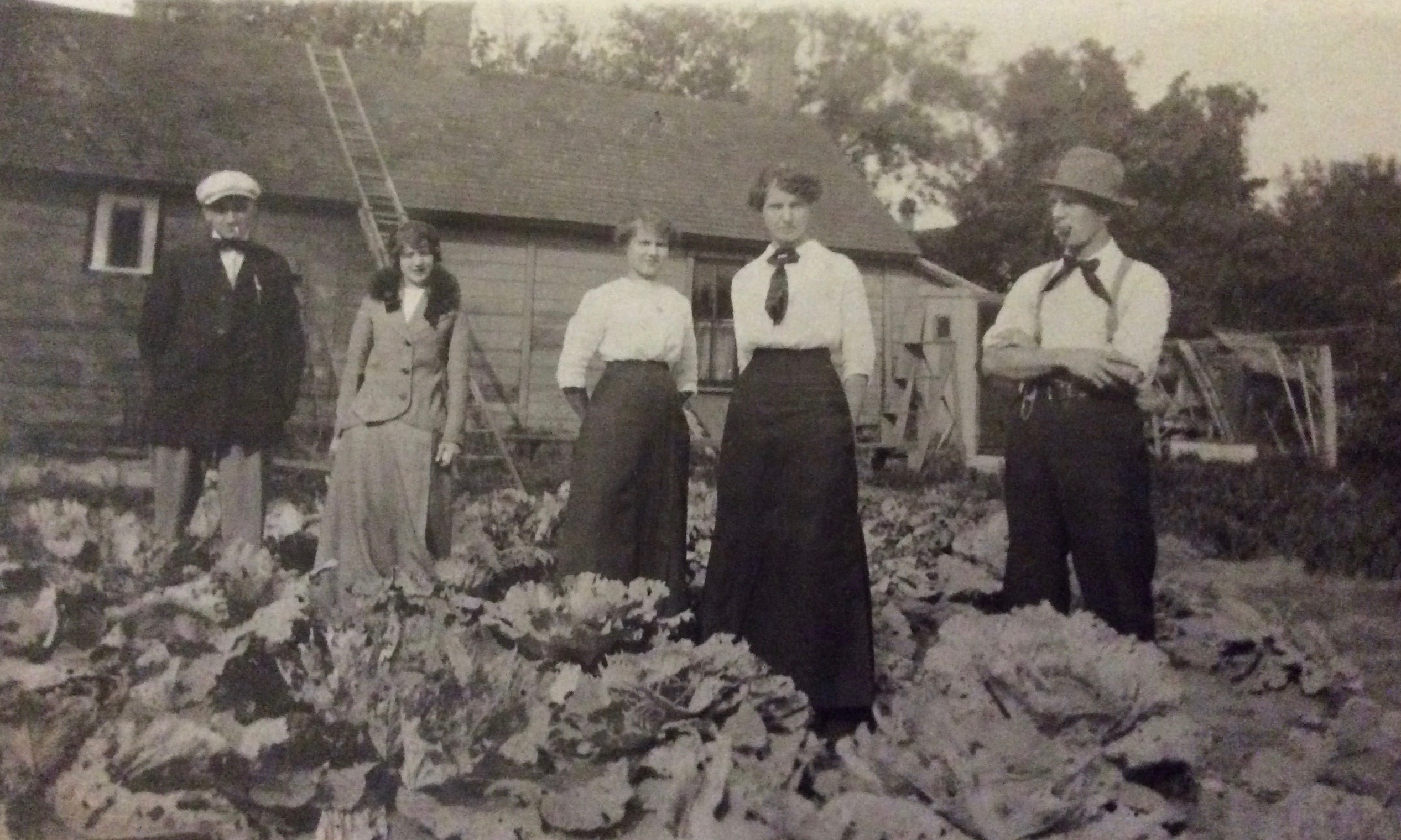 Left to right: Ben and Clara Keis, Emma Gruening, Martha and Louis Nasch Jr. in their St. Paul, Minnesota, neighborhood home garden, circa 1914–1919. The photographer is unknown.
Left to right: Ben and Clara Keis, Emma Gruening, Martha and Louis Nasch Jr. in their St. Paul, Minnesota, neighborhood home garden, circa 1914–1919. The photographer is unknown.
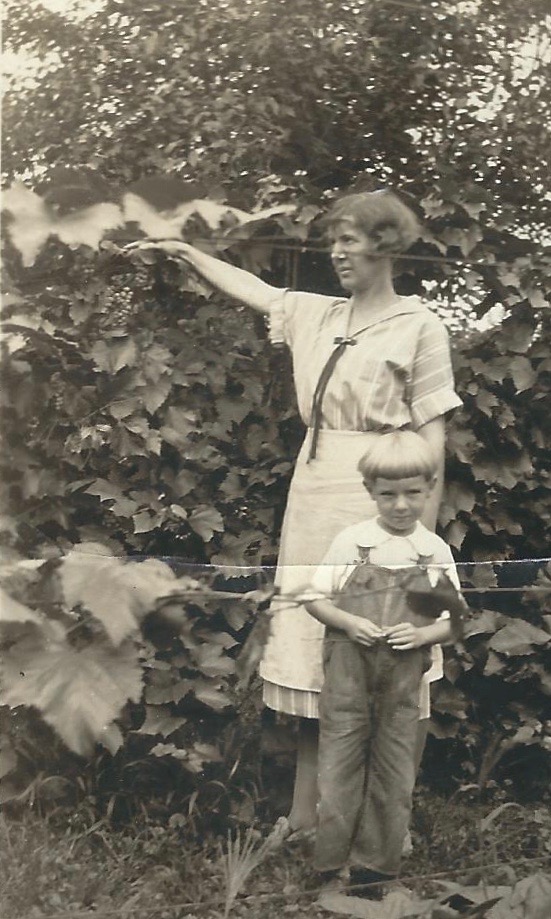 August 1926: Martha Nasch “is resting her hand up on grape vine fence,” as captioned by photographer Louis Nasch Jr. Immediately under her hand is an early bunch of grapes.
August 1926: Martha Nasch “is resting her hand up on grape vine fence,” as captioned by photographer Louis Nasch Jr. Immediately under her hand is an early bunch of grapes.
 September 1926: Martha Nasch sits with her four-year-old son, Ralph, in the backyard. Behind her appears to be a large crop of basil. They are looking at stems of Celosia.
September 1926: Martha Nasch sits with her four-year-old son, Ralph, in the backyard. Behind her appears to be a large crop of basil. They are looking at stems of Celosia.
 This image of Louis and Ralph in the garden was photographed by Martha Nasch six months prior to her forced removal to the insane asylum, where she stayed nearly seven years to treat a so-called case of nerves.
This image of Louis and Ralph in the garden was photographed by Martha Nasch six months prior to her forced removal to the insane asylum, where she stayed nearly seven years to treat a so-called case of nerves.
 August 1928: Ralph Nasch, age six, stands in front of phlox and holds a bouquet of “Cockscomb” to show his mother during one of his bimonthly visits to the hospital. This is one of an extremely few photos that was saved from the time Martha was away from the family home. Photo: Louis Nasch Jr.
August 1928: Ralph Nasch, age six, stands in front of phlox and holds a bouquet of “Cockscomb” to show his mother during one of his bimonthly visits to the hospital. This is one of an extremely few photos that was saved from the time Martha was away from the family home. Photo: Louis Nasch Jr.
Janelle has more information about her great-grandmother on her website: JanelleMolony.com/SevenYearsInsane
Have a garden you’d like to share?
Have photos to share? We’d love to see your garden, a particular collection of plants you love, or a wonderful garden you had the chance to visit!
To submit, send 5-10 photos to [email protected] along with some information about the plants in the pictures and where you took the photos. We’d love to hear where you are located, how long you’ve been gardening, successes you are proud of, failures you learned from, hopes for the future, favorite plants, or funny stories from your garden.
Have a mobile phone? Tag your photos on Facebook, Instagram or Twitter with #FineGardening!
Do you receive the GPOD by email yet? Sign up here.





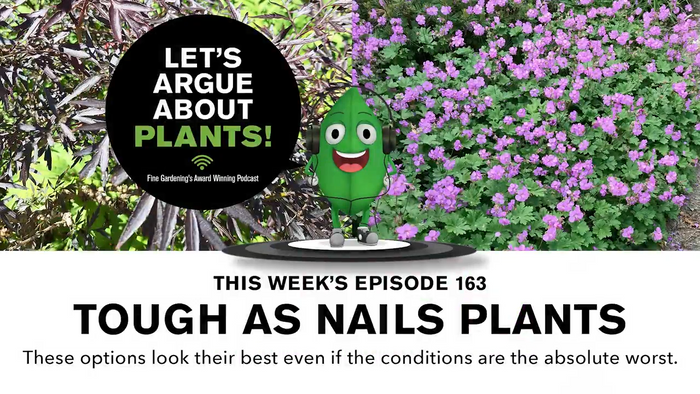
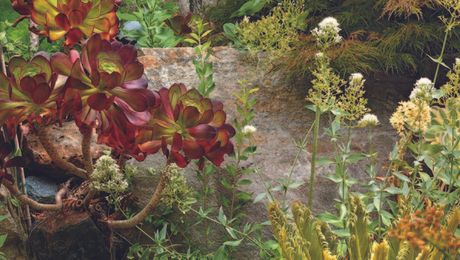
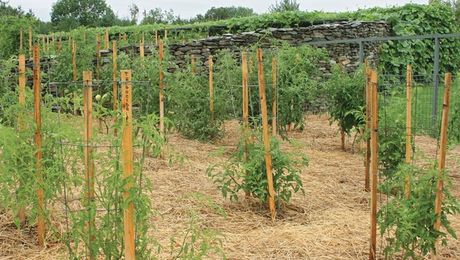









Comments
Oh, my, thank you so much for sharing this!
Thank you! It took a while to figure out the plants without color or depth in the images. Martha’s poetry helped me narrow down the options. If you see something I didn’t recognize, feel free to point it out.
Her poetry has won some awards and her story is being looked at for a PBS documentary. It’s all quite amazing.
Thank you for sharing these lovely memento photos from your great-grandparents garden. How heartbreaking that seven years of your great-grandmother's life was taken from her in that way. Clearly though that did not break her spirit as evidenced by her poetry and pondering of her garden and the flowers and produce she always kept in mind. She kept her mind busy this way rather than sinking into despair, though I'm sure there were many bad days as well. Again, thank you for sharing these photos :) Best wishes from Ontario, Canada.
With some research and help from an asylum museum docent, we learned there was a garden on the campus. It was functional - for the kitchen, but I do hope my g-grandmother volunteered there.
Thanks for the comment!! The book about Martha’s experience and full anthology of her poems is now available worldwide in English. It’s called Poems from the Asylum by Martha Nasch.
...I agree with what Katherine said, Janelle.
I was essentially speechless this morning when I read the text and looked at the photos.
Thanks for the comment. Part of me wants the family to be known for more than just "insanity" (hysteria, etc.). This is one of those ways. Makes me feel good. I'm very proud of my great-grandma.
Your great grandmother must have been extraordinarily strong in spirit. Thank goodness our laws have changed to protect women from that type of cruelty from the men in their lives. I have no doubt that working in the gardens helped her spirit to remain strong. Thank you for sharing your important family story.
Thanks for the feedback and you are welcome! I think she did her best to stay sane - thinking on the good ol’ days and such. I bet if she closed her eyes, she could go back to her “happy place” in a flowery Eden.
Fascinating! My own German relatives are also from St. Paul Minnesota during 1920a-30s.. I love historic garden photos and in this case a story stranger than fiction to go with them.
I've added your book to my GoodReads page to order/read!
Oh, that’s very kind of you! From some who have read it, the family tale has taken them back in time. The Nasches were on the “west side” near Humboldt High. I haven’t been out there yet, but still have family there. I’m content to stick to my sunny Phoenix home where the only thing I grow (“can’t kill”) are Aloe Vera.
Thanks for sharing!
What an intriguing, but heart wrenching, historical story. The decades that your g-grandmother lived in were plagued by strange controlling laws that didn’t bode well for many women. It sounds like she was brave and positive and cultivated her many talents despite the atrocities she bore.
The photos took me back to the time of my own grandmother and her beautiful gardens. Thank you for the story and lovely photo memories.
With pleasure! I only wish I could have seen it all in its full color.
What an amazing—and heartbreaking—story. Thank you for sharing with us.
And thanks to GPOD for making it possible.
She was quite the woman...and gardener. Her parents were farmers and she grew up as a farm girl. Maybe she carried over those talents to her small front yard plot?
Thanks for the encouragement!
Thanks for this story. Amazing. Today I am grateful for the strength of your great grandmother.
I as well. If you pick up the book, there are several theories for how she managed. (Poems from the Asylum, by Martha Nasch, 2021)
Fascinating and sad story - thank you for sharing!
Thanks! I'm happy to share and glad it can be found relatable to many, still today.
With pleasure! I only wish I could have seen it all in its full color.
Wow! Thanks so much for sharing this horrific story. What a convenience for Louis... So unfair.
There is so much to be said on that. She was released on parole... only because of hospital reforms that pushed hard on letting people out who were not a harm to themselves or others (social care/home care/medication).
Its a juicy tale, for sure.
Thank you for educating us about your great-grandmother, Martha. She sounds like a very strong woman who dealt with her lot in life in the best way possible. I love the photos of her, Ralph and the beautiful garden. Martha is an inspiration to all. Thank you, Janelle, for keeping her memory alive!
Thank you for the kind feedback!
Log in or create an account to post a comment.
Sign up Log in